5+ Ways to Develop a Growth Mindset Using Grit & Resilience
 When was the last time you showed resilience?
When was the last time you showed resilience?
How about grit?
It has been several years since Angela Duckworth’s TED talk catapulted these two traits into our everyday vernacular and still more since the dawn of Carol Dweck’s fixed versus growth mindset research. What have we learned?
When we demonstrate grit or are described as gritty, it is because we have had the resilience to push ourselves over, through, around, and sometimes under obstacles. How do people learn to do this?
Are people born with grit? According to research from Duckworth, Peterson, Matthews, and Kelly (2007), grit is a question of nature and nurture, not one or the other. For people to develop grit, they need to cultivate a growth mindset.
Before you read on, we thought you might like to download our three Resilience Exercises for free. These engaging, science-based exercises will help you to develop grit and effectively deal with difficult circumstances, and give you the tools to improve the resilience of your clients, students, or employees.
This Article Contains:
- The Growth Mindset Explained
- What Are Grit and Resilience?
- 5 Real-Life Examples of Grit
- Why Are Grit and Resilience Important to the Growth Mindset?
- 10 Ways to Develop Grit and Resilience
- Grit Team-Building Activities
- Developing Grit in Students
- For Children
- 5 Inspiring Quotes
- 5 Popular Books on the Topic
- A Take-Home Message
- References
The Growth Mindset Explained
Carol Dweck is widely known for her work in this field. Through her research, she identified two mindsets: fixed and growth. A fixed mindset is “believing your qualities are carved in stone,” while a growth mindset is “the belief that your basic qualities are things you can cultivate through your efforts” (Dweck, 2006, pp. 6–7).
The experience of these mindsets is on a continuum. It is not possible to always operate from one or the other. For example, you might have a fixed or growth perspective about your math ability. Maybe you think that you are horrible with numbers because they do not come naturally to you. In your mind, you either “get” math or you don’t.
On the other hand, you could have a growth mindset if you believe you have the ability to learn math because it is a skill that a person develops. Your perspective is that you do not understand it, yet.
An individual also could have a fixed mindset in one area of their life and a growth mindset in another. Maybe you believe you are not athletically inclined, so you avoid sports or other physically demanding activities. You believe people are born with athletic prowess and that they have a natural talent that you do not possess.
In another area of your life, you feel confident in your public-speaking ability, so you seek out opportunities to do that more often. You also believe it is a skill that develops with practice. Each time you do it and receive feedback, you learn how to get better. This motivates you to continue.
It is easy to understand how a fixed mindset could hold a person back. In our math ability example, that person might avoid seeking jobs that involve math. The bottom line is that some people operate from the perspective that intelligence is a finite thing. Others believe it is mutable.
In an article for the Harvard Business Review, Dweck (2016) points out three areas of confusion some experience regarding her research. First, people mix up open-mindedness and positivity with having a growth mindset, believing that they have always had a growth mindset and, therefore, always will.
Second, some people believe that praising and rewarding effort is all that matters. Her research demonstrated that acknowledging the process is critical, as is the learning and progress that led to the process.
Finally, sometimes people think that if they talk about a growth mindset, or put up posters about it, that is all that is needed. Without doing any work to create a growth mindset culture or environment, those posters are just paper on a wall.
Having a growth mindset involves understanding that taking appropriate risks sometimes leads to failure. The difference, though, is in how a person with a growth mindset defines and rebounds from that failure. People who consistently develop and maintain a growth mindset share the following characteristics (Dweck, 2006, p. 245):
- They embrace challenges.
- They persist in the face of setbacks.
- They see effort as the path to mastery.
- They learn from criticism.
- They find lessons and inspiration in the success of others.
It is not enough to shift our mindset. We also need a healthy dose of grit and resilience to achieve short- and long-term goals.
What Are Grit and Resilience?
In 2006, an aspiring PhD candidate was fascinated with the idea that some people seem to be grittier than others. Her exploration started after deciding to become a 7th-grade math teacher several years earlier. She noticed that some students appeared to have the ability to tackle long-term challenges better than others, regardless of IQ scores.
You probably have heard of Angela Lee Duckworth and her work around grit and resilience. In case you have not or need a reminder, here is her 2013 TED talk, Grit: The Power of Passion and Perseverance.
Duckworth et al. (2007) define grit this way:
“Grit is the tendency to sustain interest in and effort toward very long-term goals.”
People are born with various levels of grit, but Duckworth contends that it is a trait that develops through experience. One key to improving it, as she points out in her TED talk, is by shifting your mindset from a fixed to a growth orientation.
Because grit is about intense passion for a particular goal, people can demonstrate it in one area, but not others. Those other areas might require self-control, but not grit. Duckworth (n.d.) provides the example of completing your taxes by April 15th.
It is difficult to commit fully to multiple long-term goals simultaneously and expect that we will achieve success. For example, having the passion for becoming an ultra-marathoner while also pursuing your dream of becoming a world-class anything else would prove more than challenging. The demands of one will likely supersede the other, or your skills will not develop in either area as well as necessary.
Grit is about sustained, consistent effort toward a goal even when we struggle, falter, or temporarily fail.
Resilience is our ability to bounce back after we have struggled, faltered, or failed. It is being able to pick ourselves up, dust ourselves off, take a moment or two to collect ourselves, and then get back to the business of pursuing our goal. It involves optimism.
Some people are more resilient than others. Like grit, it is a characteristic a person can develop. The American Psychological Association (2012) created a useful resource titled The Road to Resilience. In it, the contributors define resilience as “the process of adapting well in the face of adversity, trauma, tragedy, threats or significant sources of stress — such as family and relationship problems, serious health problems or workplace and financial stressors.”
Grit is the engine that moves us toward our goal. Resilience is the oil that keeps the engine moving.
5 Real-Life Examples of Grit

Regardless of whether this is because we cringe at drawing attention to our triumphs or because it is simply unacceptable in our culture, the examples are all around us.
Here are a few:
- You are in your first year on a wrestling team, and you are learning about the sport. Every time you attend a tournament, you lose your matches. Rather than quit, you return to every practice, drill, and go to the next tournament.
- You are learning a difficult piece of music. It has complicated finger movements, and you are considered an “average” musician by your instructors. Many of your peers perform with more grace and confidence than you. Instead of giving up, you practice daily. You are deliberate in your efforts. Over several weeks, your finger movements become increasingly more fluid as you practice.
- You have always had an interest in learning a martial art, but you are over 40, and your body is not flexible. Other students are faster, stronger, and more flexible than you. You never miss training sessions, practice the techniques, and learn to adapt them to your body while also increasing your stamina, speed, and accuracy. After several months, you earn your first rank toward a black belt.
- You have never been a good artist. Your idea of drawing a person is a stick figure. Determined to learn how to draw a life-like person, you take classes at a local art school. After a few months of consistent drawing, you can create a self-portrait.
- You have always wanted to learn another language, but believe you are too old, and it will take too long to become fluent. You see a language course promoting fluency in three months, and it is geared toward people who are not natural language learners. You think this might work, so you join the program. You become involved with the active online group, complete the lessons, and post them for others to review. The end-of-course challenge is to have a 15-minute conversation in your target language. On the final day of your three-month study, you post your video.
Where have you demonstrated grit in your life? Feel free to share an example in the comment section.
Why Are Grit and Resilience Important to the Growth Mindset?
Developing grit and resilience helps a person to build and sustain a growth mindset. Duckworth (2013) might disagree, based on her 2013 TED talk. She stated that she believes a growth mindset helps build grit.
What if it is a combination of both? If people are born with some level of grit, it is possible that grit contributes to their mindset. Think about a child who is beginning to walk. Some do this without much encouragement at all. They pull themselves up, take a few steps, fall, get back up, and the process repeats until their parents cannot catch them.
Other children, after several falls, need much more encouragement to get up and try again. Is it possible that this is an early sign of grit and resilience? If people are born with a tendency toward a growth or fixed mindset, does the natural grit some people have contribute to their tendency?
People with a fixed mindset may not demonstrate grit. After all, if you believe that intelligence or other abilities are innate, what is the point in trying to improve? Duckworth’s research is ongoing, and the question of why grit and resilience are important to having a growth mindset continues.
10 Ways to Develop Grit and Resilience
Building resilience and grit varies from person to person and is influenced by our culture. Still, the American Psychological Association offers 10 ways to build resilience that just about anyone can do.
- If you are not a social person, becoming more social (i.e., purposely connecting with others) can help.
- Get control over how you respond to the adverse events you experience.
- The Greek philosopher Heraclitus gets credit for saying, “The only constant in life is change.” Get used to it. Sometimes a goal needs to be abandoned because it is no longer attainable. The inability to accept things that we cannot change is a futile pursuit.
- Apply the Kaizen principle to your goals. Start with the absolute smallest component that relates to the larger, long-term goal. As Walt Disney famously said, “We keep moving forward, opening new doors, and doing new things, because we’re curious and curiosity keeps leading us down new paths.”
- Commit to making decisions when you find yourself in a tough situation. There is no room for wishy-washy actions.
- We can learn a lot about ourselves when we struggle through a bad experience. How have our relationships grown? How have we gained strength or perspective?
- Forget negative self-talk. Trust that you know yourself better than anyone else, and you have the intelligence and power to make forthright decisions. You can solve problems as they arise.
- Bad things will happen. Try to think about them from a lifelong perspective. Draw a line on a paper representing the day you were born to the age you believe you will die. Mark off significant life events, positive and negative along that line. Place a line on that paper that represents your current age. Put a dot on that line to mark the current adversity. In the grand scheme of your life, how significant is that dot? When you look back at past events, how much or how little do they affect your life now?
- Practice optimism. This is not a denial of the bad. It is an acknowledgment of the good and what is possible in your life.
- Practice self-compassion, get some exercise, learn something new, and spend time laughing.
Not surprisingly, doing several of those 10 things can also help you develop grit.
Duckworth created the Grit Scale to measure people’s grittiness. It is a 10-question, Likert-type survey. You rate your level of agreement with each statement. Your grit score ranges from 0.0 to 5.0. The higher the score, the grittier you are as compared to the results of other American adults who participated in the most recent study (though this is not specifically identified.) Results are immediately provided.
For the therapists and educators, another excellent way to develop grit and resilience in your clients is by teaching them resilience. Our Realizing Resilience Masterclass will provide you with a full set of tools to do this.
This masterclass is highly recommended and science based. All claims are backed by science and research. You will be provided with workbooks, exercises, PowerPoint presentations, and a certificate upon completion.
Grit Team-Building Activities

- Conduct a project post mortem or after-action check-in when projects are completed. This allows the team to identify where operations worked or failed. This is a positive, lessons-learned activity with concrete plans to resolve issues that could negatively affect future projects.
- Do hard tasks together; for example, consider a ropes course or other challenge that requires contribution from every team member.
- Clarify the overall goals and mission, including time for questions, so that team members have a thorough understanding of the ‘why’ of the organization.
- Train and keep the team together throughout a project to develop team cohesiveness and support.
Several of the ways to build grit in individuals, whether they are children, teens, or adults, are useful when working with a team.
Developing Grit in Students
Dweck’s book, Mindset: The New Psychology of Success, spawned the creation of several growth mindset interventions. One of the most well-established programs is from MindsetWorks. Their focus is on working with teachers, students, and parents to develop growth mindsets in kids. Their signature program is Brainology for students in grades 4–9.
The Brainology curriculum teaches students how their brain works and how effort and learning affect their success. Dweck’s (2006) research identified that when students understand this information, they are more motivated and perform better academically.
Another important aspect of developing grit in students is understanding that according to Duckworth’s research, grit increases as we age. That 12-year-old who needs to get “grittier” likely will because of changing circumstances throughout life. She encourages people to engage in deliberate practice and to create a culture of grit. To do this, emphasize the following:
- Mistakes happen, but they are temporary opportunities from which we can learn and grow.
- Problem solving can be facilitated by breaking the problem down into smaller, more manageable parts and understanding where students may have control over the problem.
- Timely, detailed feedback is important and useful.
- Questions encourage self-reflection.
- Create goals that are just outside of reach.
- Repeatedly practice the skill the student wants to improve.
If you ask an adult what makes them gritty, they will probably say, “life.” What they mean by this is that the experiences we encounter break us down and build us up. It is through failure that we learn our greatest lessons, and those lessons often are about what it takes for us to achieve our goals.
For Children
The Big Life Journal company creates resources that help children ages four and up to develop a growth mindset. Their work and these resilience-building activities are based on research done by Carol Dweck and Angela Duckworth. These also are activities that adults can do.
- Find a purpose. When people identify their goals, this contributes to their sense of purpose and motivates them to act.
- Interview people who have experienced tough times and lived to tell the tale. This could be a grandparent, another family member, or a neighbor.
- There are lots of examples of famous people who have overcome obstacles. Watch a movie or read a book or article about them.
- Find examples of grit in nature; for example, corn stalks growing between road grates, or a tree growing from rubble.
- Read books together about perseverance.
- Help your child figure out the hard part of the problem they are experiencing. Breaking it down makes it easier to tackle. It also helps them determine which parts are within their control.
- Try “the hard thing” rule used by Duckworth. Everyone chooses a difficult task. They must finish whatever they start. No one can select the task for someone else.
- Try the “Grit Pie” exercise. The pie is the problem. Each slice is a possible cause. Have the child determine if the cause is permanent or temporary and whether they blame themselves or someone else. Often, the child will identify the problem as temporary. You can help them see how they can gain control by making some changes.
- Model a growth mindset. When your children see you setting goals, overcoming setbacks, and achieving goals, you are reinforcing a growth mindset. You also are showing them what grit and resilience look like.
Check out the Big Life Kids Podcast for engaging stories and lessons, as well as our article on How to Nurture a Growth Mindset in Kids.
5 Inspiring Quotes
There are several quotes about resilience and grit, too many from which to choose, but choose we must. These might resonate with you.
Resilience is accepting your new reality, even if it’s less good than the one you had before.
Elizabeth Edwards
Sleep is a key part of the requirements for resilience and good decision-making.
James G. Stavridis
Being gritty doesn’t mean not showing pain or pretending everything is O.K. In fact, when you look at healthy and successful and giving people, they are extraordinarily meta-cognitive. They’re able to say things like, ‘Dude, I totally lost my temper this morning.’ That ability to reflect on yourself is signature to grit.
Angela Duckworth
Humans are creatures of habit. If you quit when things get tough, it gets that much easier to quit the next time. On the other hand. If you force yourself to push through it, the grit begins to grow in you.
Travis Bradberry
Grit, in a word, is stamina. But it’s not just stamina in your effort. It’s also stamina in your direction, stamina in your interests. If you are working on different things but all of them very hard, you’re not really going to get anywhere. You’ll never become an expert.
Angela Duckworth
What inspiring quotes would you add to this list?
5 Popular Books on the Topic
No article about grit, resilience, and a growth mindset is complete without offering a few book suggestions. Many of you are familiar with the first two on this list. The other four each provide a different perspective on this topic.
1. Grit: The Power of Passion and Perseverance – Angela Duckworth
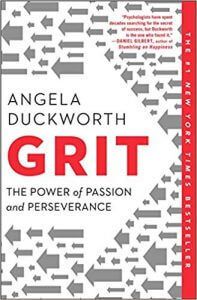
She learned that grit is not based on IQ. It is a quality that can be learned.
Duckworth reveals how to do this by teaching people to have a growth mindset.
Available on Amazon.
2. Mindset: The New Psychology of Success – Carol S. Dweck
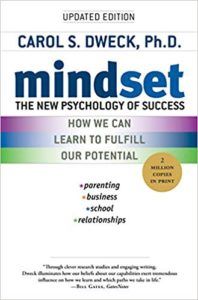
Available on Amazon.
3. Beyond Grit: Ten Powerful Practices to Gain the High-Performance Edge – Cindra Kamphoff
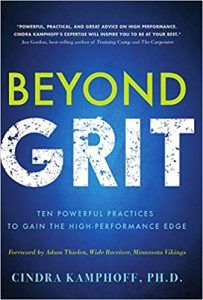
Kamphoff offers practical tools to master your mindset through ongoing attention.
Available on Amazon.
4. Emotional GRIT: 8 Steps to Master Your Emotions, Transform Your Thoughts & Change Your World – Neeta Bhushan
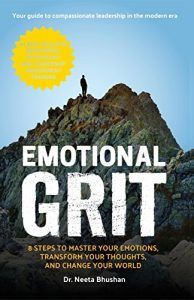
She begins by exploring the stories that hold a person back.
She helps the reader analyze these stories, break them down, and then reframe them to become emotionally gritty.
Available on Amazon.
5. The Stress Effect: Why Smart Leaders Make Dumb Decisions and What to Do About It – Henry L. Thompson
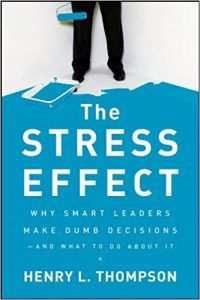
Available on Amazon.
A Take-Home Message
Grit, resilience, and a growth mindset are intertwined. Some believe these traits are innate, but others, like Dweck and Duckworth, believe they can be developed. Developing them takes time, patience, and attention.
There are many resources available, including books, programs, positive psychology podcasts, and movies that can help a person better understand these traits. Duckworth’s Grit Scale is a good place to start for those who want to assess their level of grit.
An important aspect of all the research is that grit, resilience, and growth mindsets change over time and are influenced by our thoughts, beliefs, and experiences.
How will you develop more grit and resilience so that you can experience a growth mindset in more areas of your life?
We hope you enjoyed reading this article. Don’t forget to download our three Resilience Exercises for free.
- American Psychological Association. (2012). The road to resilience. Retrieved from https://www.apa.org/helpcenter/road-resilience
- Bhushan, N. (2016). Emotional GRIT: 8 Steps to master your emotions, transform your thoughts & change your world. Emotional Grit.
- Duckworth, A. L. (n.d.) Q&A. Retrieved January 8, 2020, from https://angeladuckworth.com/qa/
- Duckworth, A. L. (2013, May 9). Grit: The power of passion and perseverance. YouTube. Retrieved from https://youtu.be/H14bBuluwB8
- Duckworth, A. L., Peterson, C., Matthews, M. D., & Kelly, D. R. (2007). Grit: Perseverance and passion for long-term goals. Journal of Personality and Social Psychology, 92(6), 1087–1101.
- Dweck, C. (2006). Mindset: The new psychology of success. Ballantine Books.
- Dweck, C. (2016, January 13). What having a “growth mindset” actually means. Harvard Business Review. Retrieved from https://hbr.org/2016/01/what-having-a-growth-mindset-actually-means
- Kamphoff, C. (2017). Beyond grit: Ten powerful practices to gain the high-performance edge. Wise Ink Creative.
- Thompson, H. L. (2010). The stress effect: Why smart leaders make dumb decisions – And what to do about it. Jossey-Bass.
Let us know your thoughts
Read other articles by their category
- Body & Brain (49)
- Coaching & Application (57)
- Compassion (26)
- Counseling (51)
- Emotional Intelligence (24)
- Gratitude (18)
- Grief & Bereavement (21)
- Happiness & SWB (40)
- Meaning & Values (26)
- Meditation (20)
- Mindfulness (45)
- Motivation & Goals (45)
- Optimism & Mindset (34)
- Positive CBT (28)
- Positive Communication (20)
- Positive Education (47)
- Positive Emotions (32)
- Positive Leadership (18)
- Positive Parenting (4)
- Positive Psychology (33)
- Positive Workplace (37)
- Productivity (17)
- Relationships (46)
- Resilience & Coping (36)
- Self Awareness (21)
- Self Esteem (38)
- Strengths & Virtues (32)
- Stress & Burnout Prevention (34)
- Theory & Books (46)
- Therapy Exercises (37)
- Types of Therapy (64)
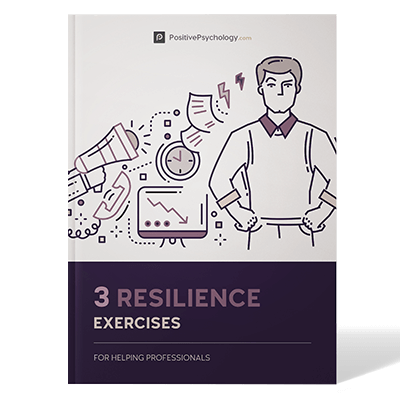
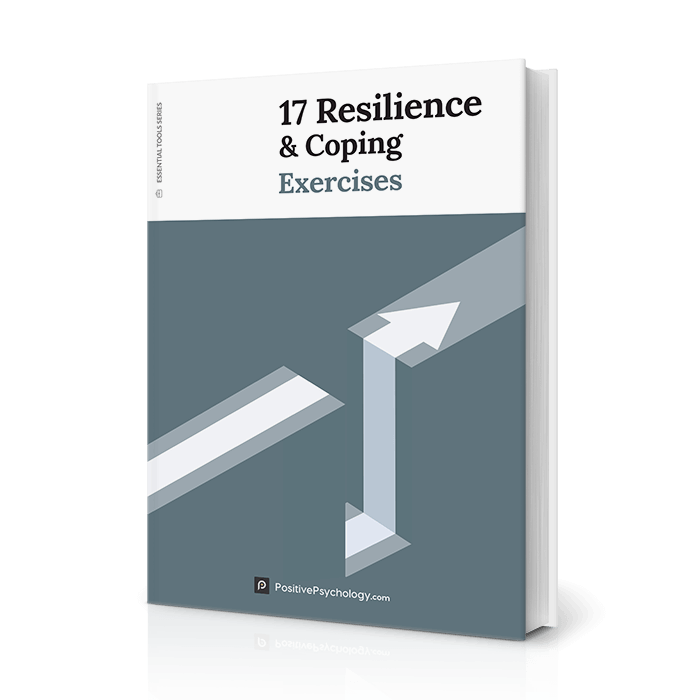



What our readers think
Enlightening!
Was looking for some takes regarding this topic and I found your article quite informative. It has given me a fresh perspective on the topic tackled. Thanks!
AMAZING! thank you.
I am doing auto ethnography PhD in nursnibg in resilience. This article has just (again) inspired me. Thank you.
Such interesting and important research; thank you! I’m hopeful that at some point more research will be done to show a potential correlation between outdoor learning/forest school/nature preschools and the development of grit and resilience. As a forest school leader, I have observed so many young people choose challenging and/or risky experiences out of curiosity or simply interest, and stick with it, despite setbacks. As Forest Day programs grow as a part of public schools, I hope research is done to see if the non-academic skills learned there (grit, resilience, autonomy, confidence, self-esteem, etc.) translate to academic work and even things like attendance or improved behavior.
Grit and Resilience is the basic feature of developing Growth mindset. and also the person with growth mindset possiblly have this characteristic of grit and Resilience.
Don’t sweat the small stuff, and it’s all small stuff.
Thank you for this practical life skill that can be implemented in daily life. I think this should be a subject for all school age children.
who is the one who actually wrote this article? im trying to cite it 🙂
Hi Coy,
This post was written by Kori D. Miller.
– Nicole | Community Manager
Glad to see you found it helpful! Thank you for reading and sharing it with others.
Hi! This is Addy. This is a wonderful article with so many tips. I think that the concept of a growth mindset is trending in pop culture. There are many business coaches that depend on “manifestation” and undue positivity. I’m happy this article clarified the concepts.
Hi Addy,
Glad to hear you found the article useful. Thanks for reading!
– Nicole | Community Manager
hello there My name is Brianna and i am a 5th grader at providence hall. I am doing research on Grit and would like to ask you a few questions. If you would call me back at (801)- 865-1930, I would really appreciate it.
Thank you.
Hi, Brianna. Thank you for getting in touch. I apologize for not getting back to you sooner. Did you get your questions answered already? If not, please contact me via email at coach (at)ardentpath.com and I’ll do my best to help you.
Kori